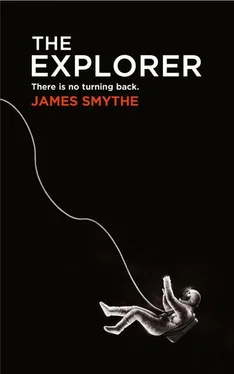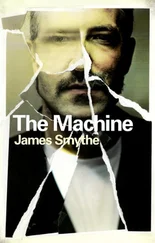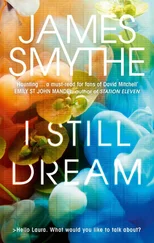That was a couple of days ago. She missed the best part of the trip, when we – I – hit our fuel limit, the 51% mark, when the ship was meant to turn itself back, send us all home. It didn’t. I watched it creep to 52%, and then tick over, and I waited for something to happen. I assumed deus ex machina : there would be clanking, something mechanical, and the ship’s engines would kick in, boosters taking us into that beautiful curve, and then I’d suddenly see Earth in the distance, a pinprick of light. I would get to watch this all on the monitors, trying to remember the star formations that we had passed, laughing as a formation that was on our left was now on the right, as I tripped past it and gaily waved. I watched it creep to 50 from 51, and then I stopped the ship. That much I knew how to do: there is a pause button, big and green, like you would find in a cartoon. All systems are frozen before they shut down automatically. They are kept on a hyper low-energy standby to preserve them, like a TV set or a computer. They Ding! when you bring them back online. When there’s a problem, a red light flashes and there’s a beep, a long, solid, irritating beep from the system speakers. The designers must have loved sci-fi films. I froze the systems so that, when they came back on, they would kick-start. I imagined the computer’s AI as being like a late student, realizing that the alarm hasn’t gone off, and then running to compensate. It wasn’t, and when I rebooted all I got was more forward movement. I spent 2% percent of the fuel wondering if we had already turned, and were heading in the right direction, heading home, but we hadn’t and we weren’t. That was that: I travel forward until I run out of fuel, and then I use the life support – a week, maybe, given that it’s just me, if I breathe in shallow breaths and then rely on the spare O 2tanks in the external suits – until I run out of air, and then I die. In many ways, it’s calming, knowing that it will probably happen: I remember reading something in the papers years ago, an article about a journalist who knew that he had cancer, knew that he was going to die, and said that it eased him. He moved on, and he had his family move on as well. There were rumours that his wife started dating before he was even dead, because that’s what he wanted. Not everybody reacts that way, but he did: he found a tranquillity in it.
All that I’ve got up here is tranquillity now, I suppose.
I eat meals by myself; or, rather, I eat them in the room with all the sleep pods and my dead colleagues, because it’s either that or the cockpit, or one of the other parts of the ship. We’ve got expansive engine rooms; massive chambers full of tech that I don’t understand, all to process the air and the water, keep us going; and storerooms, spaces that would be empty if they weren’t filled with crates of supplies we’ll never use. The power supply is cutting edge; until a year ago, it was touch and go as to whether they’d get it down small enough to actually even launch. They did. I don’t know how we ever doubted them.
It’s amazing how fast you can get bored. Emmy’s been dead for two days – I keep using that word, because in an ordinary situation we would get home and she would be brought out of sleep and somebody would be able to help her, with drugs or surgery, something to balance her. But here, she’s dead. I know that we’re not going backwards, and no pods have returned to the ship to tell me their rescue plan. I mean, not that they could have one in the first place. It would take them so long to reach me that I’d be dead by the time that they did. There is no Plan B.
I’ve become like a vampire, sitting here in the dark on my own, lusting for something – anything – other than this, other than here. I’ve turned the lights off – I flicked the switch when the computer shouted that we were crossing paths with an asteroid (Nereus, the on-screen prompt told me), just to look at it, really. Couldn’t see it though, the real version. There’s technology on the screens that shows you images, composites of what’s really out there with CG stuff, to give you information. It painted in the path of the asteroid for me; I see its tail in the distance, as it runs towards Earth, where it’ll swing around, passing close enough for bedroom-astronomers to get excited. From here, Earth is a speck, a twinkle, a flash of light. We were in space for two reasons. Guy was running tests on anomalies, things that probes and satellites and telescopes couldn’t even begin to fathom, all to further our knowledge of space. That was only the secondary reason, though: science taking a back seat to something less tangible. Our primary remit was to inspire people, to be explorers. To show the people of Earth that we – as a race – were able to take ourselves further, to push our limits, our scope. Nobody explored any more, so we were the new vanguard. It was so exciting, so important. We were going to be heroes.
The lights are off now all over the ship, and I have decided to not switch them back on again. I don’t need to, not yet. There’s very little to see here, and the lights inside the sleep pods and from the panels keep me going. Nobody’s been here before, and it’ll be years, maybe more, before people come here again. Why would they risk it? I like that nobody will know what happened. An assumption: the contactcapsules never made it back to the Moon, never made it back to Ground Control and DARPA, and they will think something happened to us. There are so many possibilities, each of them worthy of a movie. We made first contact, and now are in another galaxy, being tortured, or prepping an invasion force. We exploded, and now orbit the Earth as chunks of what we were. Somebody in the crew got Space Madness and killed everyone else. We had a hull breach. We crashed into a moon, an asteroid field, a spatial anomaly that nobody had factored in, or seen before – we made a discovery! We popped a fuel cell, ran out, we’re adrift. We never left Earth, and it was all a cover-up, our launch filmed on a sound-stage. There are different scenarios that they’ll run because they just want to know what happened to us, and this will set them back fifteen years of research. Next time, it’ll be safety first; minimize the risks. They’ll take years deliberating about whether it’s worth it; they’ll only go out with a real purpose, a reason to do it (colonization, or fuel, maybe). It’ll be decades before they think it’s safe, and the ship won’t be a prototype: it’ll be tested to near-death before it’s sent up. They’ll try to save energy by launching from the Moon, maybe, and the ship will be bigger, and it will have more fuel, and a crew of pilots and engineers. No useless straggler of a journalist. It’ll be packed to the gills with the fail-safes we went without, like an AI pilot. Whatever happens, that ship will go up and then come back down, having done what it was meant to do, even if the crew all suffer a fate that couldn’t ever be predicted. It might not even have a crew to begin with: keep it less fallible.
The ship is clean, absolutely clinical. It’s like an operating theatre, not a doctor’s surgery: there isn’t much around to tinker with. There are no lines on the floor to give us directions, no screens and beeps. There are panels that run computers, and there’s a table with a transparent lid that shows what we keep inside it – food bars, books, medical equipment. On one wall of the main cabin run plastic chairs that fold down from the wall like a cinema, all with clips on the sides that click onto the pins on the sides of our trousers to keep us sitting down if we don’t want to float. On the other wall is a table, a booth, built in, enough seating for all of us, same principle with the clips. We were meant to sit together once a day for meals. There was a list of rules that some psychologists thought up, to help us deal with being out here for so long on our own.
Читать дальше
Конец ознакомительного отрывка
Купить книгу












